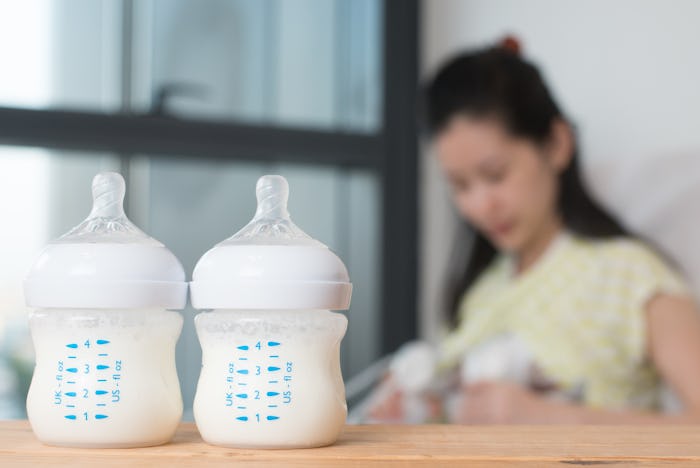Sometimes, just when you think you've mastered the art of caring for a new baby, something comes up that makes the whole thing skid to a halt. For many parents, that "thing" relates to pumping. It could be a physical problem, it could be an emotional hurtle, or it could simply be the rat race of life. But make no mistake, there are definitely signs you need to take a break from pumping.
Breastfeeding alone can be physically exhausting, so when you add pumping to the mix the entire ordeal can take a toll. Your health is most important, because if you are ill you can't help your baby, yet moms are often encouraged through subtle (but powerful!) messaging to put themselves last. But if your boobs are telling you they need a break, listen to them. It may also be that the pumping isn't necessary at that moment, so there might be better ways to use your precious (and rare) free time.
If you're unsure or worried that a break might mess up your nursing routine, you're not alone. In fact, reach out to a girlfriend who has been there, done that. Go online and surf the mommy blogs, and don't be afraid to seek professional help. Even nursing moms with well-established milk supplies sometimes have to check in for a tune up. There are different levels of lactation support, too, so it's good to know who is who and what the difference is between an International Board Certified Lactation Consultant (IBCLC), a Certified Lactation Counselor (CLC) and a Peer Counselor. The United States Lactation Consultant Association has a list of providers who are IBCLC.
Taking a break from pumping can be a really healthy, necessary thing. But it's good to know the signs of when it just might be time to do it.
1Nipple Wound
Nipple wounds and cracked nipples can occur at any time in the nursing process, but they are especially common in the early days of nursing. If you can stick to nursing alone, and take a break from pumping, that could help. Dr. Mona Gabbay, a physician in New York whose practice is entirely dedicated to the care of breastfeeding mothers and babies, has some suggestions for treating a nipple wound that will help you heal more quickly.
2Blood In Your Milk
Nipple wounds can result in bleeding, which in turn can get into your milk if you are pumping. If you are seeing blood in your breast milk, Dr. Gabbay suggests you rest the nipple for 24-48 hours. She would treat the nipple as in the nipple wound section above, and consider using a larger flange (she recommends 27mm or 30mm) on your breast pump.
3Pain While Pumping
Pumping shouldn't hurt. Danielle Downs Spradin, IBCLC, CLC, owner of Oasis Lactation Services, advises in an email to Romper that, "Sometimes getting a better flange fit, switching to a hospital grade pump, or changing to hand expression are enough to make milk expression comfortable and fruitful." She continues, "No one likes to pump and get only a few drops." Consider taking a break until you can find the proper size or right pump for you.
4Overproduction
Breast milk seems like one of those things where there's no such thing as too much. It's like liquid gold and you don't want to spill a drop of it. However, if you're making more milk than you need, you might want to take a break from pumping, too.
What causes oversupply? "Oversupply can occur naturally, but it can also be created by overstimulating the breasts in the early days and weeks of breastfeeding," Leigh Anne O'Connor, IBCLC wrote on the La Leche League site. "Pumping milk from the beginning is often encouraged with the idea that it may help establish a milk supply," she continued. O'Connor suggested that if your baby was nursing well and you weren't stockpiling milk, you can take a break from pumping. If you keep nursing and pumping at the same time, your body will think it's feeding two or three babies and produce enough milk for all of them.
How do you know when it's really too much? "Take a break if you are making enough milk for your neighbors and you are not donating to the local milk bank," O'Connor, tells Romper via email.
5Your Freezer Is Overflowing
"Some parents feel they need a giant freezer stash of milk to return to work or even if they are staying home with their baby," says Spradlin. "If the deep freezer is full, you probably don't need to continue pumping. 30 ounces is a huge cushion for most normal supply moms."
6Your Pump Is Getting More Eye Contact Than Your Baby
Of course you're pumping to benefit your baby, but there's always a risk of being a little too obsessed. O'Connor says that if this is the case, it may be time to take a break.
Check out Romper's new video series, Bearing The Motherload, where disagreeing parents from different sides of an issue sit down with a mediator and talk about how to support (and not judge) each other’s parenting perspectives. New episodes air Mondays on Facebook.
